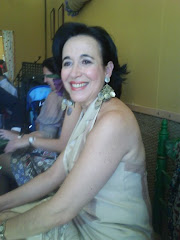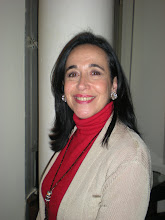domingo, 29 de noviembre de 2009
NUESTRA HERENCIA GENÉTICA
El poder de nuestra carga genética está claramente demostrada en estudios de gemelos monocigóticos; sobre todo cuando éstos se crían separados uno del otro, ciertas manifestaciones de enfermedades, gustos, preferencias y comportamientos se reproducen sin que la otra personal o haya "aprendido" del otro. Pero son muy pocos los estudios entre mellizos que nos hablen de optimismo o pesimismo... Esta actitud hacía la vida es sumamente difícil de valorar y solamente se puede afirmar que los gemelos idénticos que crecen separados se "parecen" en su optimismo o pesimismo, pero no tienen una exacta actitud hacia la vida. ¿Por qué reaccionamos de forma distinta hacia las mismas adversidades y acontecimientos? ¿Qué nos hace tan distintos y únicos? Estoy convencida que nacemos con gran potencial de optimismo y sin embargo algunos terminamos impregnados de actitudes pesimistas por habernos criado en un medio opresivo y hostil. En un hogar lleno de violencia, malos tratos psicológicos y físicos, entre 2 hijos, uno puede reproducir el mismo comportamiento y el otro evitarlo y desarrollar una personalidad totalmente sana y ausente de violencia. El aprendizaje es sumamente importante si vamos a desarrollarnos como seres humanos sanos, creativos y optimistas. El tener un ambiente propicio y favorecedor de tranquilidad, sensibilidad, confianza, sanas inquietudes, oportunidades de estudios, protección y amor; nos abren las puertas a una vida plena y llena de optimismo que actúa como "feed back" y así se crea un círculo que se auto alimenta una y otra vez. A pesar de esa carga genética, desarrollo intrauterino, influencia hormonal en el embarazo de la madre, dificultades y actuaciones en el parto, ect. que nos moldean e influyen en nuestra personalidad y nuestras respuestas emocionales ... el cerebro de cada ser humano capta y procesa de forma distinta nuestras vivencias... Quiero entonces hablar de la autoestima. Para qué sirve y por qué estamos siempre hablando de ello...
jueves, 26 de noviembre de 2009
SELF ACCEPTANCE / ACEPTARSE A SI MISMO
"He who does not doubt, does not investigate, and he who does not investigate does not perceive, and he who does not perceive remains in blindness and error". Quote from Al-Ghazali (1058-1111).
"Aquel que no duda, no investiga, y aquel que no investiga no percive, y aquel que no percive permanece en la oscuridad y el error". Al-Ghazali (1058-1111).
One of the most important factors for a "positive out look on life" is self acceptance.
To accept who we are, accept our strong and negative points, and how we want to project ourselves towards others, are escentials towards a happy existance.
But who is really totally happy with who they are? is this really a good attitude? Are we really satisfied with who we are, or are human beings for ever seeking to better ourselves; in becoming a better person, a better role model, parent, a better partner, wife, husband, student, etc.? People are composed of leyers like an onion;
we are intellectual beings, emotional beings, instictual-animal beings, and like no other, we are for ever changing, looking for our own happiness and self-fulfilment; whether seeking a better job, partner, relationship... we seem to never stop searching for a better "US".
As emotional beings, humans should not fall into apathy and pesimism. This is not a healthy approach to life and may reflect emotional suffering. On the contrary, a healthy relationship requires enthusiasm, understanding, listening skills, motivation for forgiveness, flexibitly to accept each person as a unique individual, ability to "put yourself in the other persons shoes", and the ability to forsee your partner´s need, as well as your own intimacy, degree of dependance and autonomy. HOPE is the main "fuel" that impulses and nurtures a positve relationship inorder to overcome obtacles which may appear along one´s development and towards fulfilling future plans and goals.
Are you in a healthy relationship? Are you seeking a better you? What part of your life are you most dissatisfied with? Can you do anything about it?
"Aquel que no duda, no investiga, y aquel que no investiga no percive, y aquel que no percive permanece en la oscuridad y el error". Al-Ghazali (1058-1111).
One of the most important factors for a "positive out look on life" is self acceptance.
To accept who we are, accept our strong and negative points, and how we want to project ourselves towards others, are escentials towards a happy existance.
But who is really totally happy with who they are? is this really a good attitude? Are we really satisfied with who we are, or are human beings for ever seeking to better ourselves; in becoming a better person, a better role model, parent, a better partner, wife, husband, student, etc.? People are composed of leyers like an onion;
we are intellectual beings, emotional beings, instictual-animal beings, and like no other, we are for ever changing, looking for our own happiness and self-fulfilment; whether seeking a better job, partner, relationship... we seem to never stop searching for a better "US".
As emotional beings, humans should not fall into apathy and pesimism. This is not a healthy approach to life and may reflect emotional suffering. On the contrary, a healthy relationship requires enthusiasm, understanding, listening skills, motivation for forgiveness, flexibitly to accept each person as a unique individual, ability to "put yourself in the other persons shoes", and the ability to forsee your partner´s need, as well as your own intimacy, degree of dependance and autonomy. HOPE is the main "fuel" that impulses and nurtures a positve relationship inorder to overcome obtacles which may appear along one´s development and towards fulfilling future plans and goals.
Are you in a healthy relationship? Are you seeking a better you? What part of your life are you most dissatisfied with? Can you do anything about it?
sábado, 14 de noviembre de 2009
Here I am again after many days of absence...
When people are asked, WHAT MAKES YOU TRULY HAPPY? 4 out of 5 people say "a satisfactory personal relationship with the people they love". Erich Fromm stated that the greatest wish humans have is the yearning for a satisfactory relationship. The union between people, the fussion with another human being... translates into LOVE. But are we all really capable of love? In theory, we are all born with the capability to love, but our personality, learned behavior and past experiences are also factors that mold this capacity to love. We form our own "map of love" as we grow and develope into who we are as adults. Pysical and psychological aspects of the person who is to capture our love-interest is marked mostly by influential people in our lives, especially in our early childhood years. This mental representation formed in our heads regarding who our love object should be is what makes us "fall in love" with one type of person and makes us reject others. The relationship we had with our parents clearly shapes our own intimate-love expectations... Going back to our optimistic view of life, in general, the optimistic person facilitates aproximation and stability in a relationship and the pesimistic individual encourages conflicts. Which person are you?
When people are asked, WHAT MAKES YOU TRULY HAPPY? 4 out of 5 people say "a satisfactory personal relationship with the people they love". Erich Fromm stated that the greatest wish humans have is the yearning for a satisfactory relationship. The union between people, the fussion with another human being... translates into LOVE. But are we all really capable of love? In theory, we are all born with the capability to love, but our personality, learned behavior and past experiences are also factors that mold this capacity to love. We form our own "map of love" as we grow and develope into who we are as adults. Pysical and psychological aspects of the person who is to capture our love-interest is marked mostly by influential people in our lives, especially in our early childhood years. This mental representation formed in our heads regarding who our love object should be is what makes us "fall in love" with one type of person and makes us reject others. The relationship we had with our parents clearly shapes our own intimate-love expectations... Going back to our optimistic view of life, in general, the optimistic person facilitates aproximation and stability in a relationship and the pesimistic individual encourages conflicts. Which person are you?
Suscribirse a:
Comentarios (Atom)




.jpg)
